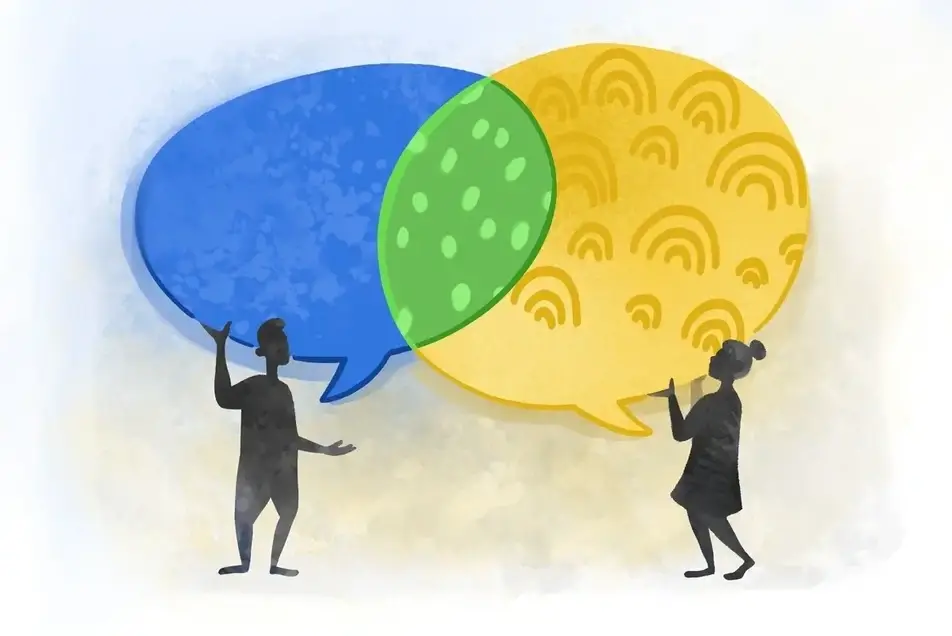3 Tips for Having Difficult Conversations

We’ve all been there: someone says something we disagree with, and we suddenly have a decision to make. “Do I speak up, or do I let it go?” For many of us, the latter is the simplest way to keep the peace. Since discussions that serve no purpose other than ruining our day are all too common, it’s understandable when we think to ourselves, “It isn’t worth it.”
The problem is that without having difficult conversations we can’t get much accomplished. Whether we’re talking political, social, or personal issues, our ability to calmly and thoughtfully communicate is the first step toward progress. Without it, progress may be stunted—even reversed.
Discussing controversial topics can be a challenge, but there are ways to make it easier. Try keeping these techniques and concepts in mind when having difficult conversations.
1. Be honest, and admit when you’re wrong
This may seem obvious, but in the middle of a heated exchange the ability to remain self-aware is often the first thing to go. We tend to cling to our opinions with fervor, especially when challenged. This is so deeply ingrained that it can be tough to accept a counter argument even when we know we’re wrong. With a little practice, however, we can unlearn some of our worst communication habits and train ourselves to approach things differently. Here are a few points to remember:
- Staying wrong is always worse than admitting you’re wrong. Remind yourself of times you’ve been corrected in the past. Not only did you survive, but you probably gained more than you lost. With a bit of effort you can start to view being wrong as an opportunity—a chance to be better, smarter, and more on-track than you were just a moment ago. Eventually, you’ll find that staying wrong for even a minute longer than you have to is the real loss.
- You are not your opinions. One of the toughest obstacles here is that being proven wrong often feels personal. Instead, try to think of your opinions like your clothes. In many ways, what you wear helps you form your sense of self, but over time you might outgrow some things; you may even look back one day embarrassed at some of your old outfits. Regardless, you always were—and still are—you underneath. All that has changed, and all that will change, is your style.
- Emulate the behavior you’d like to see. We’ve all been frustrated by someone’s stubborn unwillingness to listen to reason. Let’s not frustrate others the same way. Every time you admit you’re wrong or that you don’t know something, you’re weakening the stigma we all have toward that behavior. The more others see you owning your mistakes and misconceptions, the more likely they are to follow suit.
Honesty and humility in an argument keep you from overestimating your authority and demonstrate that you're not just trying to “win.” Instead, you’re showing that it’s about what’s right, not being right. If we can train ourselves not just to notice when we’re wrong, but to actively seek out our own mistakes, we—and our conversations—will be better for it.
2. Give others the benefit of the doubt
Among the biggest hurdles we face when arguing with others are the assumptions we make. It’s easy for us to see an objector as not just incorrect, but inferior, which can make conversation impossible. That’s why we should try to have compassion even for those with whom we deeply disagree, and focus our energy on the arguments rather than on the people making them.
If we expect to change minds, we have to push ourselves to see the humanity in everyone. It has worked in even the unlikeliest of circumstances, so it can work for you too. When engaging with people, keep these things in mind:
- Humans are complicated. Much of our public discourse depends on distilling people, ideas, and arguments into easily digestible soundbites and narratives. Don’t fall for that. For difficult conversations to work, we have to remember that everyone has many facets to their personality. The Golden Rule is instructive here. We’d certainly like it for people who disagreed with us to still see us as human, so we should do the same.
- Favor compassion over condemnation. Remember, we didn’t always know what we know now. We aren’t all privy to the same information, and we don’t all share a single belief system, education, or lived experience. All of those factors affect how we see (or don't see) the world, so it's important to take them into account when engaging with others. We can all recall moments when someone offered us compassionate guidance rather than righteous condemnation, and can easily see how much more good that did for us and our growth.
- It’s always easier to misunderstand an argument than to get it right. This is why it’s important to be able to “steel-man” the other side's position. To do this, try repeating the other person's argument back to them in a way that they would agree with. Doing that not only assures them that you get where they’re coming from, but also ensures that you aren’t wasting your time on a caricature of their point.
It’s easier than ever now for people to misunderstand and misrepresent one another. Giving each other the benefit of the doubt, having patience and compassion for those with different views, and recognizing that we’re all human—with flaws and blind spots and unconscious biases—help to prevent these errors and make difficult conversations more possible.
3. Be mindful of emotions and the environment
Things can get heated quickly. The moment we start getting agitated and raising our voices, it’s unlikely that we’re still listening—which means the conversation is over. To avoid this, try forging a few new habits:
- Take note of topics that get you riled up. Knowing what subjects reliably set you off allows you to be better prepared, and lets you keep a closer eye on yourself when going into those conversations. Also, saying something like, “This is tough for me to talk about without getting upset” gives your interlocutor another chance to be mindful and compassionate. Now, you can all work together to keep things civil and productive.
- When you find yourself getting agitated, stop. Acknowledge your feelings, take a break, and try picking it back up later. If you do lose yourself and act out in the moment, that’s ok—difficult conversations are difficult for a reason. Forgive yourself and try to address the outburst or negative comment as soon as you can. Conversely, being magnanimous when you’re on the other end of the hostility is also important. Offer others the patience and forgiveness you yourself would appreciate.
- Be extra careful when arguing in public. It’s harder for us to admit we’re wrong in front of an audience, and the likelihood of taking cheap shots also rises exponentially. Online, character counts and the risk of misinterpreting tone make communication even harder. It’s often better to switch to a private message or an in-person chat. If that’s not an option, continue to be mindful of your emotions and pay attention to the pace of the conversation. If you find yourselves constantly interrupting and talking over one another, or responding faster than it would take to truly process what the other person just said, it might be a good idea to stop.
It can be tough to keep your cool, but practicing mindfulness and taking stock of your emotional state is key to keeping things on track. Difficult conversations in public forums are fraught with additional challenges, but they also offer unique opportunities. Even if you can’t get through to the person you’re directly talking to, bystanders and fence-sitters might be moved by your arguments—especially if you try your best to be fair.
Quick tips for difficult conversations
- Beware of using quotes and statistics. They can be very helpful, but sometimes statistics can be misleading and quotes can imply things the person never meant. These errors not only weaken your argument, but also risk making it appear as though you’re acting in bad faith.
- Choose metaphors and analogies carefully. Everyone interprets things differently, and shifting the conversation toward abstractions may do more harm than good. If you use an analogy or a metaphor, make sure you aren’t oversimplifying, and be honest if you recognize places where the comparison doesn’t hold up.
- Don’t overload people with sources. With difficult topics it’s hard not to refer to articles, podcasts, or videos, but keeping those references to a minimum increases the likelihood that people will actually check them out. And of course, make sure those sources are legitimate and reliable before sharing them.
- Look out for logical fallacies. These “reasoning errors” or “illegal moves” in arguments, whether committed consciously or not, will inevitably veer your discussion off course. It’s important to be familiar with the various fallacies and gently point them out—in yourself and in others—whenever they occur.
Remember the goal
The single most important thing to keep in mind is why you’re having difficult conversations in the first place. No matter the topic, the goal should be to honestly exchange points of view in the spirit of progress and resolution. We should all genuinely want to get to the bottom of things and learn as much as we can, because that’s how we grow and move our society forward.
For better or for worse, we built this world together. All that we’ve accomplished, and all we’ve yet to accomplish, has been and will be contingent upon our ability to communicate. However misguided some of us may be, the vast majority of people really do want to make the world a better place. Effective conversation is our best tool for achieving that end. Although we will never see eye-to-eye on everything, if we can all agree on that, there’s reason to be hopeful.
Angel uses his skills as a storyteller to support and inspire job seekers and aspiring social-impact professionals.






